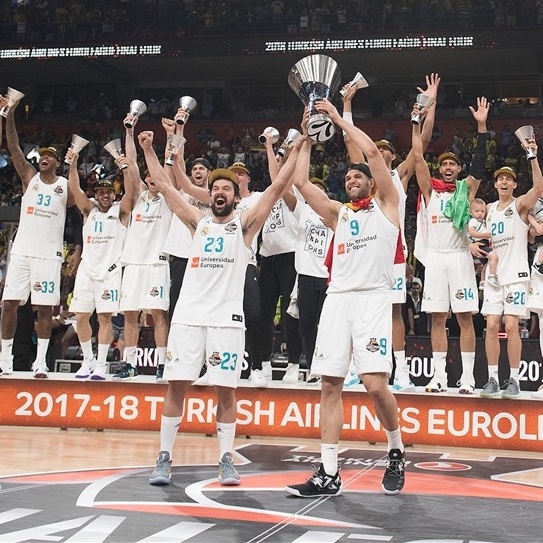
It was a week off for Euroleague, so a bunch of teams got very angry over domestic matters. Things got stupid fast, potentially earth shaking decisions were rashly put out there, and now it’s time to talk about the real motivations. Emmet Ryan on the teams that are hinting at leaving town
The national cup week is reliable for a few things, none more than teams complaining about referees. Every sport has people complaining about refs, few have front offices as brazen about being willing to go nuclear over them as basketball in this lovely continent of ours.
All the rows
For those who weren’t paying attention. Olympiacos kicked things off by refusing to come out for the second half of their cup game with Panathinaikos. Oly have been moaning about their treatment for years in Greece, their rivals in Green tend to save these complaints for Euroleague, neither likes each other, and things got terribly childish awfully fast. PAO owner Dimitris Giannakopoulos responded by putting red women’s underwear*, lingerie for those who care, on the Olympiacos bench. Oly were docked points in the league by the Greek league, have subsequently contemplated pulling out and everybody is riled up.
*Aside from being awfully sexist, it was terribly unoriginal and showed a lack of thought about the relative strength of genitalia for a man whose fortune comes via pharmaceuticals. Balls are fragile and, frankly, can’t take even the threat of a beating. A lady’s nether regions are made of sterner stuff by far. I’d like to be surprised that I’m writing this on a basketball site but I’m not, you’re not, and nobody really can be.
The Turkish cup final was a bit of a bore, Fenerbahce beat Anadolu Efes and it was a poor performance by the most fun team in Europe this year in defeat. After the game, their head coach Ergin Ataman said his side should have walked out too.
Then along came the Spanish Copa del Rey where the refs had a pretty bad night. First there was a terrible missed call where Anthony Randolph knew he was a lucky boy against Barcelona’s Chris Singleton only for the refs to subsequently make a goaltending call to decide the game and give the win to Barcelona. Real were, understandably, upset. Their response would best be described as ludicrous. Wanting some sort of discipline for the refs is understandable but their demands have included a multi-season suspension for said refs and that they never ref Real again. Oh, and they are also threatening to pull out of the Spanish league.
A little more out of sight, Eurocup side Crvena Zvezda were also quite upset about losing to their arch rivals Partizan in the Serbian cup final.
For our analysis series The Ballin After, post-game interviews, and more, subscribe to BallinEurope’s YouTube channel
Think beyond the raw rivalries
That all of these massive over-reactions occurred in games between arch-rivals is no accident, it’s naturally where such matters tend to come to a head here. That a couple of the sides are talking about going nuclear isn’t exactly new, although Real going to the sheer level they have is somewhat new. It’s somewhat easier to bring up these grievances during national cups because they are the tertiary competitions for all sides involved, the one where getting angry has the the least blowback. They are also an easy way to test the waters on what people think about certain stances such as…
Closed shop Euroleague
The road to a fully closed Euroleague has been laid out, if and when it would be workable is another matter entirely. Teams threatening to pull out of national leagues now are essentially testing the waters for what they see as likely at an indeterminate date in the future. Right now there are 5 double weeks in Euroleague. That is growing to 9 next year with the expansion to 18 teams. An expansion to 20 would make it 13 and you can just forget about teams being ok with that, a full national league slate, playoffs in both, and national cups. Real know their fans will back them, they’ve learned that, and now it’s about seeing how that road forms.
Testing the waters for fan reaction is one thing but there are a few realities that need examining. As ever, we begin with the upsides for those involved
No limits on players
There are limits that vary wildly around Europe over how many home grown players, or at least those with a local passport, have to be on the roster. This leads to some roster gymnastics and odd scenarios where teams essentially have players only available for Euroleague duty in order to work around quotas for domestic leagues. The purpose behind this is good, to foster locally produced talent, but it’s generally ended up having no real impact. If a player is good enough, they get a game.
If they are not, they get paid rather well to sit on a bench and smile while occasionally collecting a winner’s medal. In Fenerbahce’s Euroleague title winning season of 2017, their captain Melih Mahmutoğlu averaged 10 minutes a game but was on the floor for just 2 minutes and 35 seconds in total for their 5 games in the playoffs and Final Four. That’s not fostering domestic talent and he’s far too fun a player to watch to have in such a spot.
There are other limitations, like the Russian Rule which is oddly no longer in Russia but very much the case in Israel. In this case, two Israeli players must be on the floor for a team at all times. For Maccabi Tel Aviv this would be politely considered a nuisance.
A higher calibre of game
Playing more games against more good teams raises the overall standard. It’s simple, doesn’t need much explanation, and clearly has upside.
A single focus
Having a single end goal definitely helps with the narrative of a season. Buducnost are the best example of just how many titles a team can be aiming for in a single season. At the start of this season they had opportunities to compete for Euroleague, Adriatic league (ABA), Montenegrin league, and Montenegrin cup titles. They’ve won the last of those and are essentially out of the playoff race in Europe. They are contending in ABA and won’t rejoin the Montenegrin league until after that at which point they will probably win that because up until last year’s surprise loss in the finals they had won literally ever Montenegrin league title ever.
Most teams have three competitions, a domestic league, a European competition, and a national cup. It’s terribly similar to basically every other sport on the continent and it’s not confusing for the fans of the individual clubs.
Euroleague however is unlike any other sport’s primary European competition as it is trying to be a true league, as in everybody plays like they do in their national leagues. That makes bringing the casual fan on board harder and Euroleague definitely wants those fans on board because money. Yeah, about that.
It won’t necessarily mean more cash
National league TV deals vary wildly across territories but they all deliver something to the coffers of clubs that play in them, including the Euroleague sides. Any closed version of Euroleague is going to have to cover that shortfall and more. There is no guarantee of that. Furthermore, while clubs are getting the support from their die hards while testing the waters there is nothing to say that games in Euroleague against non contenders will be any more of a draw through turnstiles than local opponents with whom a side has some kind of history.
BallinEurope now has merch, like actual merch, t-shirts, phone covers, and even pillows. Check it all out on our RedBubble page.
Parity isn’t in the DNA
People, not money, are the primary reason some NBA sides can be terrible for decades, looking at you Kings and Knicks. The salary cap system there doesn’t guarantee parity even with smart people but it makes the road to being competitive far more believable and manageable. Even with taxes in some states being nicer for high earners or the cost of living being lower, the gaps are pretty small.
In Euroleague, there’s no cap and there’s no realistic way to expect one ever existing. There are regional laws to get around, far from easy, and that’s before looking at the opposition individual clubs would have to their financial muscle being weakened.
The tax situation varies far more as does the cost of living. For a team like Zalgiris Kaunas, that can help offset some of the disparity in budget they would have with a Real Madrid or even Maccabi but not by much and there’s still Fenerbahce in Istanbul where such an edge is negligible if it even exists.
That’s going to limit the chance for teams to be competitive, being perennially middling or worse is only tolerable for NBA fans because the league is designed to allow them to find a way to the top. Euroleague teams in that lower class are going to become like me, a UCD football fan who is now scared of success because of the reliable comfort mediocrity brings me.That’s really hard to sell. As it stands, those fans can hope for lightning in a bottle one year in Europe while still being regular contenders/The Thanos of Podgorica in their national leagues.
There will always be teams willing to replace the underclass, otherwise football wouldn’t be a viable product in Europe, but the model Euroleague wants down the line relies on there simply not being an underclass. Everyone has to be plausibly able to compete and not be at the mercy of whoever is rich right now.
It’s not like FIBA will just sit back
Domestic federations have different goals to their big clubs and while they ultimately likely won’t stop a breakaway in the full sense, they can gum up the works quite a bit on the way out. It’s in the interest of these federations to protect their competitions and they won’t lose the big earners for them without a big fight. That could delay things, make the move more expensive. It could also lead to a few teams blinking and getting nervy. Hardly the smooth transition that would be preferred for a league that wants to build a clear identity.
So, what if there was some actual collaboration?
The easiest and smoothest way to create a standalone league separate from national leagues, for all the issues that come with it, would be to actually work alongside FIBA in terms of making the break smooth. This would be really difficult because of the whole civil war that is still ongoing. FIBA and Euroleague have what would best be described as very different stances on the future of the sport. A means to get everything Euroleague wants without hassle really has to involve something going back to FIBA. The logical price, which FIBA won’t accept as enough but is at least something, is to free up spaces in the calendar for international windows. It’s probably not enough but, hey, it’s a time to test the water.
Splitting is not easy, it won’t solves everything, it may not solve anything, and if it is going to happen then the very structure of the league is going to need real thought. It wouldn’t be European basketball if it wasn’t a little bit mad.
To keep up to date with everything on BiE, like BallinEurope on Facebook




Leave a Reply